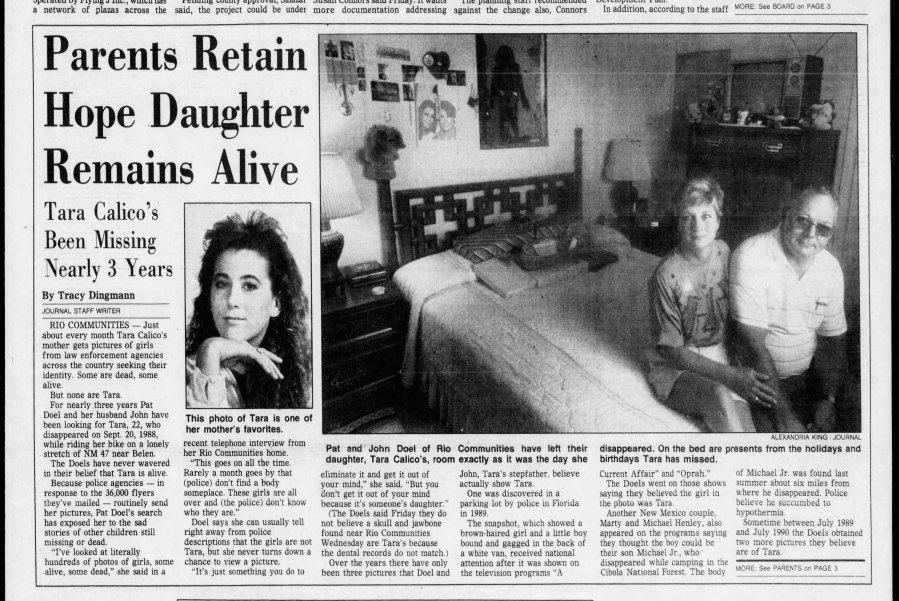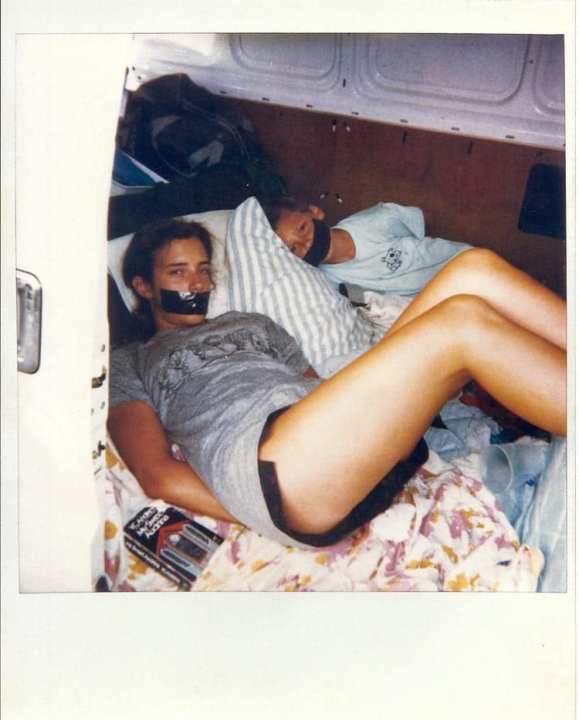Tara Calico went on her usual bike ride on Sep. 20, 1988, but the 19-year-old college student never came home. Over the years, authorities have offered rewards and investigated countless leads and tips, but there are still no answers.
(NewsNation) — One mystery has perplexed the state of New Mexico for more than three decades: The case of a college student who went on a bike ride and never came home.
Calico left her house in Belen, New Mexico, at around 9:30 a.m., wearing a white tee shirt, gold hoop earrings and white shorts with green stripes. She was riding a neon pink Huffy mountain bike. Calico was last seen on Highway 47 in Valencia County, where a witness saw a pickup truck following closely behind her at a slow speed.
Calico told her mother to come pick her up if she wasn’t home by noon and her mom sounded the alarm when she couldn’t find Calico on her bike route.
Melinda Esquibel is one of Calico’s high school friends. She’s spent years investigating the case on her own time.
“My team and I have already solved it,” Esquibel told NewsNation.
She and Calico met in high school marching band.
“She was a lot of fun, she liked to have fun, she liked to laugh. She was just happy-go-lucky at that time, really, doing what young girls at that age do,” Esquibel said.
Esquibel said she never fully processed the trauma of losing her friend until 2008, on the 20th anniversary of Calico’s disappearance. Her mother sent her an article about the case.
“I just burst into tears, because it all came back. It just stuck with me that after all this time they didn’t know what had happened,” she said.
Now, Esquibel is working on a docuseries and has a podcast on what she’s dug up on Calico’s case.
She says the Valencia County Sheriff’s Office gave her the chance to go through Calico’s case files, which she says she organized and digitized, working with professional private investigators and offering up her own findings to police.
But after all these years, Esquibel isn’t satisfied with how her friend’s case has been handled.
“These are sources that I spent years developing and gaining trust with and a lot of that was broken,” Esquibel said.
Lt. Joseph Rowland, with the Valencia County Sheriff’s Office, was assigned to the case in 2016. He says he’s been in regular contact with Calico’s sister, Michelle, as both of Calico’s parents are deceased. Rowland said outside help on the case has brought mixed results.
“Does it help or does it hinder? The answer is it does both. Any information is better than no information,” Rowland said.
He said public trust in law enforcement was tarnished because of a local theory that the sheriff in 1988 was part of a coverup. Online sleuths claim the son of former Sheriff Lawrence Romero was involved in Calico’s disappearance.
Romero and his son have since passed away, and Rowland said the theory was formally investigated and never proven. The main source of the rumor was a local man who told a deputy he believed his neighbor might have a makeshift grave in his basement.
Some people claimed the man was referring to Romero, Jr., although Rowland said that wasn’t the case. Police did investigate three locations with ties to Romero Jr., including a basement, the area under a local bar and a pond by a quarry where he worked.
“He was a kid involved in drugs, partying, drinking, and his father was the Sheriff. And had the persona of ‘Well my dad is Sheriff so I can do whatever I want and I won’t get in trouble, right?’ And kind of went around town with the attitude that he owned it or he could do whatever he wanted. That’s the impression that I received from community members,” Rowland said.
Rowland said he has been working to clear up any misinformation.
“I have no dog in the fight, where ever the facts are gonna lead I’m gonna go,” he said.
It’s not the only theory that’s surfaced online.
About a year after Calico’s disappearance, a polaroid was found in a Florida parking lot, appearing to show a young woman and little boy tied up in a van.
Many people, including Calico’s mother, believe she was the girl in the photo.
Analysts have never been able to tell for sure who is in the picture and Rowland said the photo itself may not even be real.
“A lot of the little details that are in that photograph do not point to an abduction, it’s more of a gag photo,” he said.
Rowland said misinformation about the case has spread online, including a rumor that Calico’s walkman, containing her Boston cassette tape, was found, potentially giving law enforcement information on where she was last seen. Calico’s parents circulated information about that supposed evidence, which Rowland said was inaccurate.
“There was a cassette tape found on the side of the road. It had been exposed to the sun for so long that it distorted its color and degraded the cassette tape, so not consistent with a cassette tape that somebody was listening to less than 24 hours before,” he said.
He also said some plastic found in the area was not consistent with being part of a walkman.
The FBI has been involved in the case from day one, but Special Agent Raul Bujanda, with the FBI’s Albuquerque office, declined to share specific information on the case.
“From the federal perspective, we never want to go ahead and share any piece of information that might benefit those individuals that we’re still trying to put behind bars, to pay for the crimes they committed,” he said.
He also declined to say if he believed the case was solvable or if the perpetrators were still alive, in contrast to local law enforcement and Calico’s loved ones, who believe the case can still be closed.
One thing Rowland and Esquibel agree on is that the perpetrators are still alive and are likely local.
“This case is solvable,” Rowland said. “Here we are 34 years later, I do not suspect that this case or Tara’s disappearance will go unanswered for 36 years.”
Esquibel believes she knows what happened.
“She was being stalked, that she had turned someone down for a date and they were not happy about it,” Esquibel said. “They started messing with her, asking her to go to a party, getting real close to her. You know the boys were drunk and high, and they hit her, and knocked her off her bike. We believe she took off running to the east.”
After that, Esquibel said she thinks the boys sexually assaulted Calico, then killed her to prevent her from speaking out.
Esquibel said she herself has been threatened for speaking out.
“It started to put my life in danger, I started having threats, people were showing up at my mother’s house. My niece came to me and told me that the guys that did it, were really angry. And then if I didn’t stop, someone would get hurt. And if I didn’t stop, because if I still continued, someone would get killed,” she said.
Despite that, Esquibel wants to keep shining a light on her friend’s case.
Rowland said he still gets tips every couple of months and new people have recently come forward, leading to new witnesses in the case.
“The number one mission has always been in this investigation to bring Tara Calico home. That remains the number one mission today,” he said. “A close second would be prosecuting those responsible for her disappearance. But foremost, we want to bring her home to her family, which is long overdue.”






